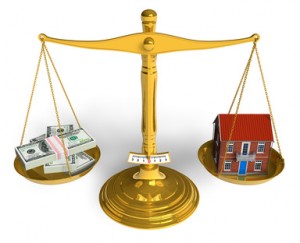What is the fair market value of my home?
These are two very common questions when people are considering selling a home. Talk to any real estate agent, and the first thing they’ll tell you about calculating home value is that location is a big factor, but not the only factor. After the big real estate crash many people are asking themselves, “What is the fair market value of my home?”
Most of us understand there are more factors involved in calculating home value than just granite countertops and stainless steel appliances. We also know that there are online sources like HouseValues.com that can assist with determining house values by address. HouseValues.com is one of the best ways to calculate the market value of your house because it doesn’t just use algorithms and general housing data. HouseValues.com has a local real estate expert in your area to determine the real fair market value of your home. It’s okay if you are just checking out the value of your home and aren’t actually ready to sell your house. Asking an agent to help with calculating your home value is very common in today’s economy. Many people are wondering, “Could we sell our home if we had to or wanted to?”
Whether you are trying to calculate the value of your home because you are thinking of selling or just out of curiosity, here are five factors to consider.
Five Factors that Help Determine the Market Value of Your Home
Home Location
Location is the key influence for calculating the value of your home. Besides the proximity of the home to a major metropolitan area or a breathtaking view, these are a few more location factors that can increase home value:
- Proximity to schools, parks and points of interest
Homes within reasonable walkability to schools or parks will strongly influence buyers with small children. However, homes that boarder school or park property lines may suffer in home value due to unwanted traffic, parking limitations and the likelihood of youth mischief.
- Neighborhood with increasing desirability
Where is new growth heading in town? Will there be any new business areas, grocery stores, or libraries in the future?
- Proximity to infrastructure
Is the house surrounded by other houses? Apartment complexes? Other buildings? The best possible situation for your home is to be situated between two other houses and located along a road without yellow traffic lines.
Homebuyer Demographics
After you buy a house, the market value of your home is affected by who else is likely to purchase the property. If the property is a perfect starter home for pre-family newlyweds, and the main homebuyers in town are senior-citizens, the fair market value of your home might be lower than you think.
Older buyers typically look for one story homes without stairs, whereas families with small children often desire homes with a front yard away from a busy street and multiple bathtubs.
Home Storage Space
The more closets, garages and laundry rooms a house has, the higher the fair market value of your home. Most homebuyers look for a walk-in closet in the master bedroom, as well as closets in high traffic areas like front entryways, bathrooms and other bedrooms.
The two-door garage is the most common size for most homes, yet three-car garages are becoming more and more common.
As for the laundry room, the washer and dryer units should be located together in a common access space without creating an eyesore.
Kitchen
The kitchen is the most active area of a home. Typically, the following features add value to the kitchen:
- Granite countertops
- Stainless steel appliances
- Gas stovetops
- Convection ovens and microwaves
- Ice machines
- Cable television access ports
Also, the proximity of the kitchen to the dining room and family room will impact the usability of the house and thus is a factor in calculating the value of your home.
Home Layout and Size
Homebuyers typically look for homes with three to five bedrooms with an average of one shower per every two bedrooms. Split bedroom plans with bedrooms on opposite sides of the house are a popular trend with modern homes. Also, many real estate professionals love to use the phrase “light and bright” to highlight homes with lots of natural lighting.
As for size, most residential neighborhoods will have a slight variation in square-footage and number of rooms, but they all should be within a standard deviation of one another. If resale value of your home is a big concern, it’s in your best interest to not buy the largest home in the neighborhood. When calculating the market value of your home, real estate professionals measure the homes in the surrounding area against yours, and if most of the nearby properties are smaller than yours, it can act as an anchor to drag down your fair market value.


Hi. Thank you for posting this post. That helped me alot.
Great information! I’ve been looking for something like this for a while now. Thanks!
I have to say that for the past few of hours i have been hooked by the impressive posts on this website. Keep up the wonderful work.